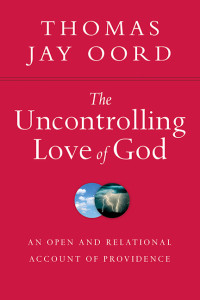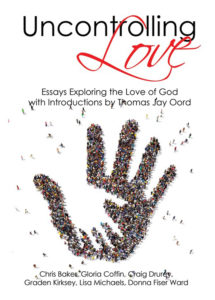What Does God’s Love Do?
If God’s love is uncontrolling, what does it actually do? Is God involved in our lives? Or is God like an object that inspires without directly affecting us? Something else?
In a recent International Journal of Systematic Theology article, Kevin Vanhoozer offers a dialogue between John Webster’s views of love and my own. Kevin wonders if my view of God’s uncontrolling love means God is ineffective in bringing real change.
In this essay, I explain that God’s uncontrolling love makes a real, direct, and causal difference in the world.
What Divine Love Does
Vanhoozer wonders what God’s love actually does. “If it is real,” he says, “it should make a difference.” I agree.
My theology emphasizes that God’s love makes an actual difference in creation. God acts in many ways to promote wellbeing. God is the necessary cause in the existence of everything, moment by moment. But I do not think God’s action controls others.
I often refer to Aristotelean notions of causation when explaining my view. I think God expresses love as efficient, final, or formal causes, for instance. But God never acts as a sufficient cause. That would involve divine control. God always loves, and divine love is uncontrolling.
God’s love is more than an example that we might find inspiring. It is also directly affecting us moment by moment, empowering us to choose.
An Uncontrolling God Acts
Vanhoozer’s comments remind me of a worry the philosopher Arthur Holmes once raised. Holmes argued against theologies that say God lovingly persuades but never coerces. To him, the God who persuades “cannot act.”[1]
Holmes seems not to see the important distinction between 1) acting that affects outcomes and 2) acting that unilaterally determines outcomes. The vast majority of, if not all, actions we witness in the world affect others without controlling them.
In my view, God’s always acts, and divine love is action that makes a difference. Creatures or creation more generally cannot prevent God from acting. The outcomes God desires for creation, however, require creaturely response. Because God’s actions are always loving, God never singlehandedly determines others to generate outcomes.
The Marriage Proposal
I acted when asking my fiancé’ to marry me. Her favorable response, however, was required for the outcome I desired.
If I had tried to force, control, or unilaterally determine her, few would call such coercion loving. If she responds positively to me, however, we can say my action made a difference in generating the outcome I wanted: marriage. I think divine love is analogous.
Of course, I’m happy to say that my marriage proposal was accepted, and Cheryl and I have been married for almost 30 years. And my goal for our marriage to be excellent still requires her response. One person cannot guarantee a happy marriage!
God’s Love is Effective
Vanhoozer introduces a word in his essay that I do not think describes my view of God’s action well. That word is “non-effectual.” When summarizing my theology, he says I believe “God thus loves creatures not by strongly causing (i.e., determining) good things, but rather by constantly issuing non-effectual calls, thus weakly causing good things (when they happen).”
The word “non-effectual,” as Vanhoozer uses it, might sound as though he thinks my view entails that God’s actions do not produce any effect. He apparently means by “non-effectual” that I am claiming God’s actions do not necessarily produce God’s desired effect.[2]
To describe my view better, Vanhoozer might rephrase his sentence. The revised sentence might say “God loves creatures not by controlling events and thereby unilaterally causing good things but rather by constantly calling and empowering creatures, thereby symbiotically causing good things (as creation cooperates).”
This alternative statement rightly emphasizes my view that God’s actions are causal but not controlling. God’s actions in the world require creaturely cooperation to produce the results God wants. God’s actions prompt creatures to act in ways to produce some desired effect, but they do not necessarily produce such an effect.
Is Strong Divine Action “Determining?”
In summarizing my view, Vanhoozer says “strong” divine action is “determining.” This implies that weak divine action involves lack of control, in the sense of not producing the desired effect necessarily.
It seems that Vanhoozer believes controlling others to produce desired outcomes is the “stronger” form of power. I once believed this. But as I have argued in various publications, I now believe God’s almighty power is uncontrolling love.[3] And as I argued in previous blogs, this uncontrolling love can do miracles.
I believe the strongest form of power is cooperative rather than controlling. And many essayists in the new book, Uncontrolling Love, seem to agree.
God Acts as an Omnipresent Spirit
Let me conclude with brief words about God’s being. Like most theologians, I think that God is incorporeal. God is spirit (Jn. 4:24). I deny that God has a localized, physical, divine body with which God exerts an impact.
The biblical notions of God as ruach and pneuma are important for understanding why God fails to prevent genuine evil. While in some instances we use our bodies to prevent evil, God as spirit has no localized divine body to use in this way.
As spirit, God exerts efficient causation of the sort we think metaphysically analogous to other causal occurrences in the world. But efficient causation does not mean sufficient causation. Affecting others doesn’t mean controlling them.
One view of the human mind-body relationship helps as an analogy. Just as our minds exert efficient causal influence upon our bodies without entirely determining them, so God as spirit exerts causal influence upon creatures without entirely determining them. God acts causally without controlling others.[4]
Conclusion
God always acts, and we creatures cannot control God. God’s love is uncontrollable.
But God’s actions never control creatures. “Love does not force its own way,” to quote the Apostle Paul. Or to put it my language, God’s love always influences but is also always uncontrolling.
Notes
[1] Arthur F. Holmes, “Why God Cannot Act,” in Process Theology, ed. Ronald Nash (Grand Rapids, Mich.: Baker, 1987).
[2] I am grateful to Kevin Vanhoozer for responding to a first draft of this essay and clarifying what he means by “effectual.” I tried to incorporate his thoughts here.
[3] See my books, Defining Love: A Philosophical, Scientific, and Theological Engagement (Grand Rapids, Mich.: Brazos, 2010); The Nature of Love: A Theology; and The Uncontrolling Love of God.
[4] For more on God acting as a spirit, see my essay, “The Divine Spirit as Causal and Personal,” in Zygon 48, no. 2 (2013): 466-77.

Comments